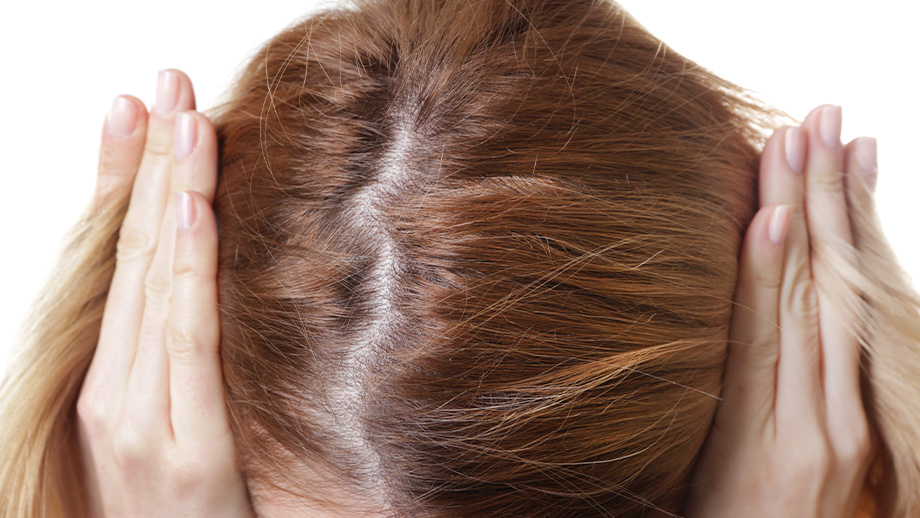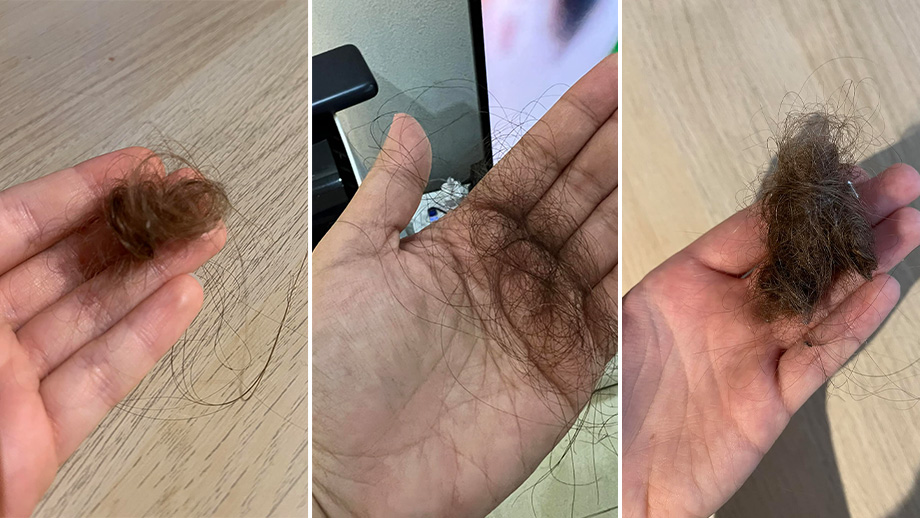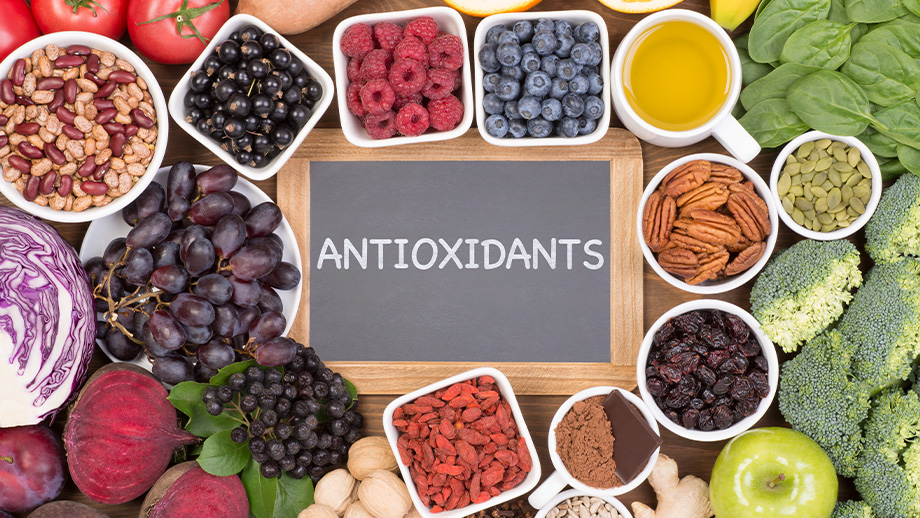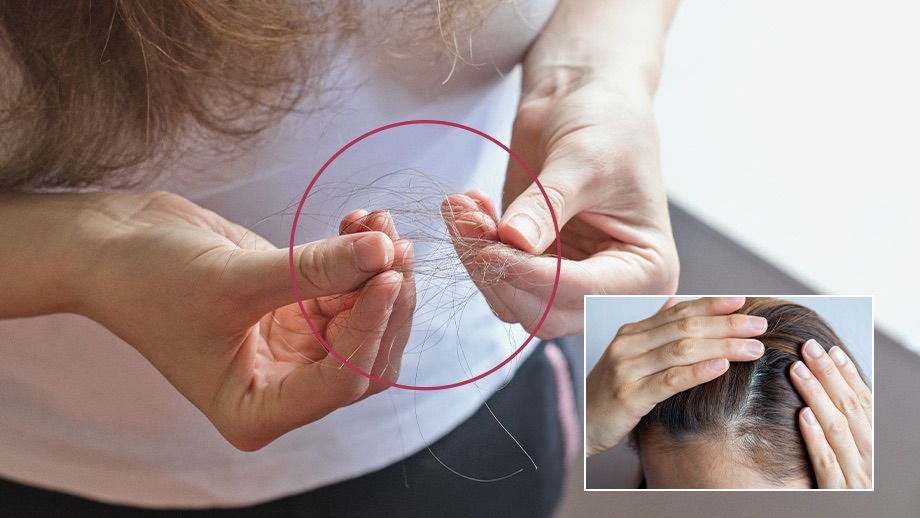What are the struggles of PCOS hair thinning? Well, imagine a shower wall and drain full of hair and having to empty your hairbrush every day. Perhaps you look in the mirror and see small bald spots forming. Or maybe you can see your scalp through your thinning hair.
For women with PCOS, they don’t have to imagine. This daily reality affects 20% to 30% of women suffering from polycystic ovarian syndrome and hair loss.
Hair goes through a natural growth and shedding cycle. Thus, hair falling out is completely normal. However, when this cycle is disrupted or out of balance, it can result in hair loss.
But what can you do about it? Today, we’ll examine why PCOS causes hair thinning and treatments to stop hair loss.
Female Pattern Hair Loss and PCOS

Female Pattern Hair Loss
Female pattern hair loss (FPHL) is different from male-patterned hair loss or balding. However, it can manifest in similar patterns. But balding at the back of the scalp is not the only pattern women can experience.
FPHL can follow a male pattern, Christmas tree pattern, or centrifugal pattern (from the center of the scalp out in a radius). The onset of PCOS-related hair thinning can vary among individuals. It may occur gradually and become more noticeable over time.
Additionally, not all women with PCOS will experience hair loss, and the severity of hair thinning can vary widely. Genetic factors, lifestyle, and other health conditions can also influence hair health. While this can be a symptom of PCOS, not everyone with female pattern hair loss has polycystic ovarian syndrome. Let’s look at what can cause this in women.
Does PCOS Cause Hair Thinning and Why?
PCOS can cause hair thinning on the head and excess hair growth in places you don’t want it. This can cause emotional distress and anxiety in many individuals. Several things affect thinning hair in PCOS.
These include genetic susceptibility, androgen excess, and low-grade chronic inflammation. However, women with female pattern hair loss don’t always have high levels of androgens, suggesting other potential causes. Let’s go into more depth on some of these and how they relate to PCOS.
Androgen Excess and PCOS Hair Thinning
Hormonal Imbalance: PCOS is characterized by hormonal imbalances, particularly elevated levels of androgens (male hormones) like testosterone and DHT. Excess androgens can disrupt the hair growth cycle, leading to hair thinning and hair loss on the scalp.
Insulin Resistance: Insulin resistance, another hallmark of PCOS, can contribute to increased androgen production and further exacerbate hair thinning.
Sensitivity to Androgens: Some individuals with PCOS have a genetic predisposition that makes their hair follicles more sensitive to androgens. This sensitivity can cause the hair follicles to shrink and produce thinner, shorter hair strands. This can lead to finer hair that doesn’t look as full.
Increased LH: Women with PCOS often have an imbalance in the ratio of luteinizing hormone (LH) to follicle-stimulating hormone (FSH). Elevated LH relative to FSH levels can stimulate the ovaries to produce more androgens, leading to hair thinning and other PCOS symptoms.
Lower SHBG: The protein sex hormone-binding globulin binds to sex hormones in the bloodstream, regulating their availability. In PCOS, lower SHBG levels mean that more androgens circulate freely in the bloodstream, increasing their impact on hair follicles.
Chronic Inflammation and Hair Loss
Low-grade chronic inflammation can disrupt various processes, including those related to hair growth. PCOS can cause inflammation in numerous ways. Let’s discuss how chronic inflammation can affect hair thinning.
Impact on Hair Follicles: Inflammation can affect the health of hair follicles by disrupting their growth cycle and function. Inflamed hair follicles may produce thinner and weaker hair strands, leading to hair thinning over time.
Immune System Response: The body’s immune response to chronic low-grade inflammation can also play a role in hair thinning. Immune cells release signaling molecules that can influence hair follicle health and growth cycle.
Scalp Health: Additionally, inflammation can affect the scalp’s health, potentially creating an unfavorable environment for hair growth. An inflamed or irritated scalp can contribute to hair thinning in PCOS as well.
Insulin Resistance: Finally, elevated insulin levels can trigger low-grade inflammation throughout the body. Inflammation can also stimulate the production of androgens.
Elevated androgen levels, particularly testosterone and its metabolite DHT (dihydrotestosterone), are associated with hair follicle shrinkage and hair thinning in PCOS.
Recognizing Hair Thinning: What to Look For

Recognizing Hair Loss In PCOS
PCOS may cause the hair to fall out quicker than it can regrow. And due to the high androgens, it may cause male-patterned balding in certain patches. If you feel worried about hair loss in PCOS, here are a few things you can look for.
• Wider part: You may notice that your hair part appears wider than it used to.
• Thinning crown: Hair thinning often starts at the crown of the head. You may see your scalp through your hairline more easily.
• Increased hair shedding: You may notice more hair on your brush or in the shower drain. Or you may have more hair come out when you run your hands through it.
• Reduced hair volume: Your hair might feel less dense or voluminous than before.
Can You Reverse Hair Loss and Thinning in PCOS?
You can sometimes reverse hair loss in PCOS. However, this depends on several factors, including the underlying cause, early intervention, and the effectiveness of treatment.
Losing weight can help improve insulin resistance and androgen production in some cases. The sooner you detect and address hair loss, the sooner you can get help. You can take steps to slow or reverse the hair-thinning process.
Your healthcare provider may prescribe medications to address hormonal imbalances, such as hormonal birth control or anti-androgen medications like spironolactone.
You can also apply over-the-counter topical treatments like minoxidil (Rogaine) directly to the scalp to stimulate hair growth. These can help regulate androgen levels and slow down hair thinning. However, response to treatment varies from person to person.
Furthermore, lifestyle modifications, including a balanced diet, regular exercise, stress management, and adequate sleep, can support overall health and potentially improve hair quality and growth. Gentle hair care practices can help protect existing hair. Look for mild shampoos and avoid excessive heat styling or tight hairstyles that can stress hair and damage hair.
Additionally, maintaining a healthy scalp through proper cleansing and moisturizing can create a favorable environment for hair growth. You can also take supplements that support hair health. Let’s look at more treatment options.
The Best Natural Treatment Options for PCOS-Related Hair Thinning

Jess E / H&B Vitamins Facebook Group
If you suspect PCOS-related hair thinning, consult a healthcare provider specializing in PCOS or a dermatologist. They can help diagnose the cause and recommend appropriate treatments. You can ask them about some of the options below and what they would suggest for your individual needs.
According to an article by the National Institutes of Health, “Treatment can be complex, as common treatments to promote hair growth can exacerbate undesired hirsutism, which can be overcome by cosmetic treatments.”
For example, biotin, which can help hair health, can also increase the growth of unwanted facial hair (hirsutism), which is also a dominant symptom of PCOS.
Additionally, a combination of approaches can help improve underlying drivers and visible hair health. Let’s look at some natural supplements for improving hair thinning for PCOS.
Spearmint Tea
Spearmint tea also has effective anti-androgen properties. One study found that in a 30-day trial, it can improve excess facial hair growth and the LH to FSH ratio. Taking two cups daily or spearmint tea extract supplements can help reduce hair thinning and other PCOS symptoms. Learn more about the benefits of spearmint tea for PCOS here.
Saw Palmetto
Saw palmetto extract is a supplement derived from the berries of a type of fan palm. A study on plant-derived anti-androgens found that saw palmetto “inhibits 5-alpha reductase, thereby reducing the conversion of normal testosterone into the more potent DHT.” Thus, it can help improve the driver of PCOS hair loss.
Zinc
Zinc helps maintain balanced levels of androgens like testosterone, which, when elevated, can contribute to hair follicle miniaturization and hair loss.
It also supports a healthy immune system. Inflammatory conditions or autoimmune responses affect the hair follicles. Zinc also benefits scalp health. It helps with cell division and tissue repair, contributing to a healthier scalp environment for hair growth.
This nutrient also forms a component of keratin, the protein that makes up the hair shaft. It helps strengthen hair strands, reduce breakage, and promote healthier hair texture. This supplement from Health & Balance Vitamins contains zinc and many other vitamins for hair and skin health.
Vitamin B3 (Niacin)
Vitamin B3, also known as niacin, can help improve blood circulation, benefiting the scalp. Adequate blood flow to the hair follicles ensures they receive essential nutrients and oxygen, promoting healthy hair growth.
Additionally, vitamin B3 has anti-inflammatory properties, which may help reduce inflammation on the scalp. Niacin can also improve the structure and strength of hair strands.
It helps with the formation of keratin, a protein that makes up the hair shaft. Stronger hair is less prone to breakage and damage. One study on female hair loss showed that niacin supplementation for six months significantly improved hair fullness.
Omega-3
Omega-3 fatty acids support overall skin health, including the scalp. A healthy scalp is essential for optimal hair growth. Omega-3s can help maintain scalp moisture and reduce dryness, flakiness, and itching. It can also mitigate the effect of androgens on hair follicles.
One study found that 6-month supplementation with omega-3 and 6 antioxidants improved hair thinning and led to fuller, healthier hair.
It also has anti-inflammatory properties, contributing to the strength and integrity of hair strands. This can reduce hair breakage and improve hair texture and appearance.
Omega-3s can also improve blood circulation, ensuring hair follicles receive essential nutrients and oxygen for healthy growth.
Diet

Antioxidants Are A Good Choice For An Anti-Inflammatory Diet!
Anti-androgen and anti-inflammatory diets for PCOS can help reduce hormone levels and inflammation. Reducing these factors can have a positive outcome on hair health. Incorporating foods such as soy, nuts, seeds, fish, and vegetables can help you get the nutrients your hair needs.
For example, a study published by the National Institutes of Health found that walnuts helped reduce the free androgen index and increase SHBG (sex hormone-binding globulin) in women with PCOS.
As we learned earlier, higher SHBG can limit the amount of free testosterone and other androgens in the body. Thus, eating these anti-androgen foods can improve hair thinning through hormonal balance.
A Full Head of Hope for Your PCOS Hair Thinning
Watching your hair fall out and thin can be emotionally distressing. It can cause anxiety when you start to notice balding patches on your scalp.
Don’t lose hope, as you can find effective ways to slow and stop hair loss. And with the right treatment and support, you can start to see your hair looking and feeling fuller than before. However, it will take time.
Looking into a combination of approaches can give you a better chance of reversing your hair loss. Supplements, diet, exercise, and hair and scalp routines can all work together and lead to positive results.
Remember that everyone’s journey is unique, and what works best for you may vary. Be patient and persistent, and consult with healthcare professionals who understand PCOS to find the most effective solutions for your hair health.
Do you suffer from thinning hair as a symptom of your PCOS? What tips have you tried? Let us know below!








